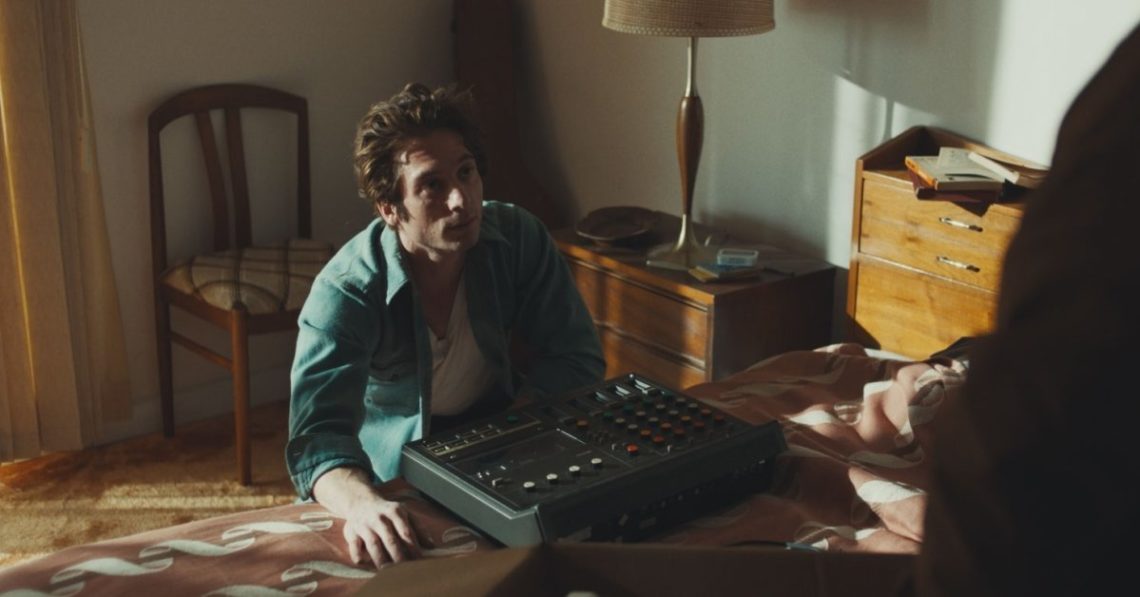It can’t be easy to make a movie about the creation of a whispery, shivery work of art like Bruce Springsteen’s 1982 Nebraska, an album whose title track was inspired by the real-life late-1950s killing spree of 19-year-old Charlie Starkweather and his 14-year-old girlfriend Caril Ann Fugate. Nor can it be easy to make a movie about an artist suffering from depression, as Springsteen was when he made the album. How do you present overwhelming feelings of despair, or the sense of just feeling wholly lost, on a movie screen in a dynamic way? Maybe that’s why Scott Cooper’s Springsteen: Deliver Me From Nowhere—starring Jeremy Allen White—feels a little ghostly itself, a movie half-inhabited by a strain of melancholy you can’t quite find the word for.
The picture opens as Bruce is riding high, perhaps a little too high for a working-class Freehold, New Jersey kid who bought his first guitar after seeing the Beatles on the Ed Sullivan Show in 1964. His 1975 album Born to Run had ignited a run of hits that made him a bigger star, faster, than he’d bargained for, and by 1981, as he was wrapping up his tour in support of 1980’s double album The River, he’d become bewildered and worn down by his own fame, feeling isolated from the ordinary folk he’d grown up with and written songs about. He retreated to a small rental house in Colt’s Neck, N.J., to figure out his next steps and write a few songs, which he laid down on a four-track recorder, a lo-fi experiment intended as a demo.
This is the territory Deliver Me from Nowhere covers, and if it sounds like lore—well, by this point, Springsteen’s story feels more like lore than reality. (The movie’s source material is Warren Zanes’ 2023 book of the same name.) One of the picture’s most admirable qualities is that we never really see Bruce falling apart. There’s no major crackup, no rock-bottom reckoning. White simply plays Bruce as a man adrift, a rock’n’roll astronaut cut loose from his space module. He looks washed out, a little zonked, nothing like the guy we see in the movie’s most exhilarating scene, an early one, giving his usual all to a massive concert audience, flanked by his usual compatriots the E Street Band.
We see White showing up at that little Colt’s Neck house, a way of retreating not just from his recent past, but maybe even from his future. He unwinds, and keeps his mojo working, by occasionally ducking into his old stomping ground, the Stone Pony in Asbury Park, trying to remain as anonymous impossible. He takes a fancy to a young single mom, Faye (Odessa Young), and begins courting her, though it seems that young Bruce is not at this point a particularly good bet in the boyfriend department. He charms Faye by using his executive privilege as a rock star to gain entrance to Asbury Park after-hours; he watches as she rides the merry-go-round. But just when she starts to believe he might stick around for a while, he’s gotta be on his way. I love you, baby, but I just can’t stay, and all that.
Meanwhile, he’s first making and later defending that weird, unearthly demo. The songs arise from the all time he’s spent alone, reading Flannery O’Connor and catching Terence Malick’s Badlands (another imagining of the Starkweather-Fugate saga) on TV. We see him flopped in the bedroom of that rental house, dressed in his plaid-flannel-shirt uniform as he strums his guitar, the sunlight streaming in just so as it tries to bestow its usual blessing. Later, he’ll record the songs with his band, at New York’s legendary Power Station. But he’s unhappy with what he hears. He wants the demo released as it is, which at first befuddles his manager and close friend Jon Landau (played, with turtleneck courtliness, by Jeremy Strong), while Columbia executive Al Teller (David Krumholtz, welcome wherever and whenever he shows up) sweats proverbial bullets. Landau understands and supports not just Bruce’s vision but Bruce himself, which is how Nebraska, so bleak and bewitching, eventually emerges into the world.
Cooper intersperses black-and-white flashbacks throughout: we get glimpses of Bruce as a kid with sugar-bowl-handle ears (played, with plaintive charm, by Matthew Pellicano Jr.) being terrorized by his depressive father, Douglas (Stephen Graham), a recurring childhood trauma he’ll have to reckon with. Cooper—director of pictures like Crazy Heart, Hostiles, and most recently The Pale Blue Eye—makes sure the proceedings are always restrained and respectful. You can believe this is really how it all went down, particularly in a scene where Bruce finally talks to Landau about the depth of his suffering: “I don’t think I can outrun this anymore,” he says, revealing in a blunt tumble of words everything he’s not-so-successfully been trying to hide.
White is quietly effective as Bruce, having perfected the singer’s trademark honeycomb rasp. It’s not just that White has figured out how to sing like Springsteen, or even that he’s somehow able to channel his youthful, sweaty charisma. It’s that he’s clicked into Springsteen’s ability to surprise and delight himself. He can be singing a song he’s performed maybe 100 times, or even 1000—and suddenly he’ll come to a line and laugh a little, with his eyes open wide, as if he’s just unlocked a secret along with the audience.
Springsteen is one of the great live performers of the modern era, and White, in that early performance sequence, captures his electricity. But the rest of the time, his Bruce is just a reluctant rock’n’roll star trying desperately to be a regular guy, laying down a bunch of low-key tunes in his rented bedroom. In real life, Springsteen’s insistence on scaling back—with Landau’s support—may have saved his life, or at least his sanity. Deliver Me from Nowhere sketches out that idea without aggressively underlining it; for that reason, it often feels less than dynamic, perhaps a little inert. But then, sometimes it’s what a movie doesn’t show that matters. We all think we know the truth of Bruce Springsteen. Doesn’t he belong to us, after all? Deliver Me from Nowhere shows us another truth, the sound of a ghost captured on a length of tape.
The post Jeremy Allen White Beautifully Channels a Lost Rock Star in Springsteen: Deliver Me From Nowhere appeared first on TIME.




